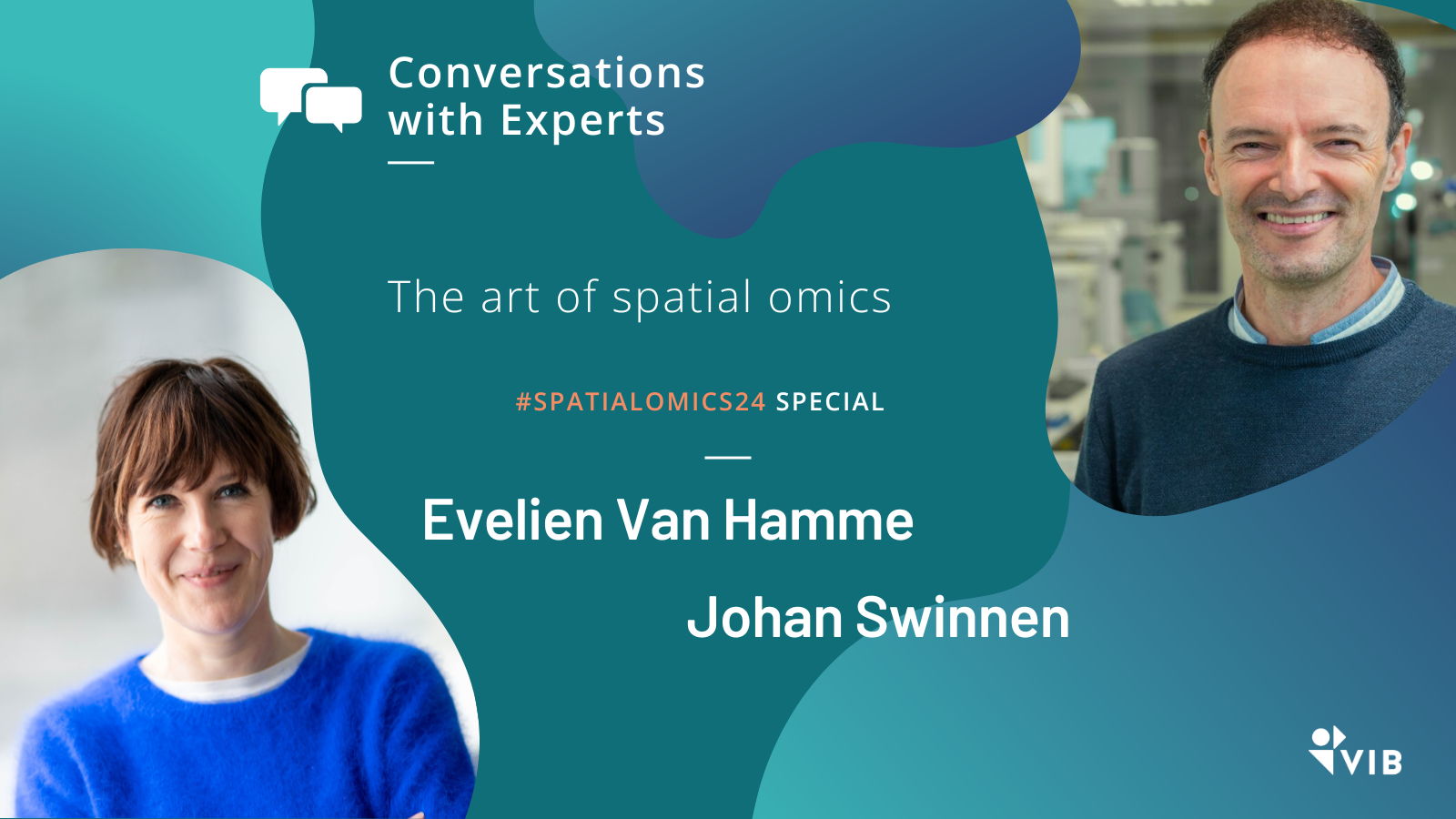Conversations with Experts: the art of spatial omics
"Bringing together researchers to exchange experiences and maximize resource utilization is crucial"
In anticipation of the upcoming Spatial Omics conference, we had the pleasure of speaking with two experts and organizing committee members. The first is Johan Swinnen, head of the Laboratory of Lipid Metabolism and Cancer at KU Leuven. The other expert is Evelien Van Hamme, who leads the Spatial Catalyst at VIB. Each, in their own way, is an expert in spatial omics, a technique that is transforming our understanding of biological tissues.
.png)
For more background, check out our previous blog on spatial omics.
Could you tell us a bit more about your work and how you integrate spatial omics?
Johan: "My research focuses on altered lipid metabolism in cancer. Leveraging mass spectrometry-based lipidomics (the study of different types of lipids), we've observed profound changes in cellular lipid composition accompanying cancer development. Spatial omics now offers a promising avenue to dive deeper into these changes in the context of the tissue architecture and understand the broader genetic context influencing lipid modulation. Our main goal is to translate these insights into innovative diagnostic tests and treatments."
Evelien: “My role is rather unique. I lead a team within VIB Technologies that is passionate about spatial biology, and our aim is to make spatial technologies available within and also beyond VIB. We facilitate access to these technologies and provide support for data analysis – a significant bottleneck for researchers. By fostering collaborations and sharing expertise, we aim to empower researchers to leverage spatial omics effectively."
Do you collaborate with each other?
Johan: "While I collaborate with some VIB Core Facilities on protocols and best practices, I haven't specifically collaborated with the Spatial Catalyst team. However, being part of the conference organizing committee has brought us together!"
Evelien (laughs): "Indeed, now that we've met, we're certainly open to future collaborations!"

Speaking of the conference, why do you think spatial omics is such a hot topic right now?
Johan: "Biology operates in a broader spatial context, revealing a level of complexity far beyond our initial understanding. With spatial omics, we can study cells in their native context, shedding light on heterogeneity and interaction and unveiling critical insights. For instance, in cancer immunotherapy, understanding the spatial distribution of immune cells relative to cancer cells informs treatment strategies."
Evelien: "Right, the topic is just generally really hot and happening. The rapid advancements in technology and market development underscore its significance. It’s also a costly technology. That’s why bringing together researchers to exchange experiences and maximize resource utilization is crucial. I think a conference is the most fun way to do this and to stay updated on the latest developments."
Is there any specific topic or speaker you’re excited about?
Johan: "I think the scope of the program is really interesting. It offers a comprehensive overview of emerging developments, from academic to industry innovations. I'm also eager to learn more about niche advancements, like Wei Min's presentation on vibrational rainbow markers. It promises to be a very interesting conference featuring research pioneers and groundbreaking topics."
Evelien: "I agree. Personally, I’m particularly interested in hearing about new approaches or progress in multi-omics. I'm also looking forward to Joakim Lundeberg's talk on untargeted spatial transcriptomics, a foundational technique in the field."
Where do you personally think the next breakthrough lies in this field?
Evelien: "Combining transcriptomics and metabolomics would be a significant leap forward! Overcoming sample preparation challenges will enable the application of both techniques to the same tissue section, revealing insights we currently simply don’t have access to. Alternatively, advances in data analysis that allow the integration of data from adjacent sections could provide a robust solution. But if we could really do it on the same tissue, that would be awesome!"
Johan: "As our ability to examine processes at the single-cell and even subcellular and single-molecule level improves, we gain a more comprehensive understanding. Additionally, advances in data integration and bioinformatics hold immense promise. Personally, I envision a shift towards understanding functional aspects, deciphering molecular interactions, and elucidating biological processes underlying various conditions."
If you weren't a scientist, what path might you have taken?
Evelien: "If I had another life, I think I’d have liked to be a civil engineer who builds bridges. I think stability, and constructing grand bridges would align with my interests. Now I think about it, this actually mirrors my current role! I also build bridges by fostering connections and accelerating progress within the scientific community."
Johan: "I’m also right where I’m supposed to be. I’ve always known I wanted to be a cancer researcher. When I was 11, in ski class, a friend got a call that his aunt had died of cancer. That was the defining point for me. I've remained focused on molecular research throughout my career, but I also find the societal context of my research important. I run ultra-marathons and make movies, write books, and use art to convey messages and give courage to people confronted with cancer. I've found ways to blend my biggest passions."
Read about Johan’s actions here (in Dutch). One of Johan’s documentaries, 'Een boo(n)tje voor...', an ode to those who passed away from cancer, has made it to the second round of the Ultimas Public Award 2023 and received recognition at several international film festivals.
What's the best piece of advice you've ever received, and how has it impacted your life?
Evelien: "That’s an easy question for me. The reassurance that 'everything will always be alright' resonated deeply. It's a mantra from a master’s student I mentored that's guided me through life's challenges, proving true time and again."
Johan: "For me, it was believing in a specific goal, even amid uncertainty. Embracing serendipitous discoveries and deviating from conventional paths led to profound insights. My career has been shaped by these unexpected findings."
Thank you, both! Looking forward to seeing you at the conference.
India Jane Wise
Read more




